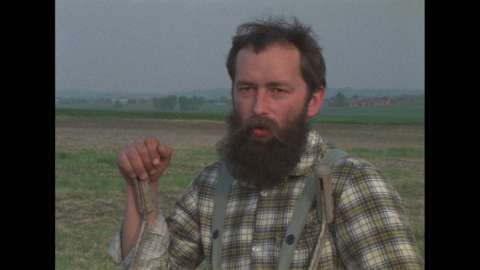Mr. Karwowski, 27. 5. 1987, ?
Questions to the narrator
- 00:08So, the first question: How would you describe the situation of non-collectivised farmers in Poland today?
- 00:09How would you describe this situation in a sentence?
- 01:59Could you also describe some restrictions imposed by the state? I mean specific examples, you know. How do you get machines for example?
- 02:45And are these herbicides available to all non-collectivised farmers equally or is there any diversification?
- 03:31Could you briefly describe this situation and then compare it with that of a non-collectivised farmer and the contract system?
Metadata
| Location | ? |
| Date | 27. 5. 1987 |
| Length | 05:45 |
Watch and Listen
| Full video (mp4, 5 min) |
| Preview video (mp4, 0 min) |
| Audio track (mp3, 5 min)
|
TranscriptPlease note that this transcript is based on audio tracks and doesn't have to match exactly the video
So, the first question: How would you describe the situation of non-collectivised farmers in Poland today?
The situation strictly depends on the economic conditions that the state creates for farmers, specifically for us. The situation looks very bleak at the moment as there is no far-sighted agricultural policy. This is how I feel, not least because the state sets the prices on all the means of production that are necessary for farming. On the other hand—the very same state sets prices on agricultural produce, without subsidising us, the farmers, I mean the prices, but using such monopolistic, oppressive measures towards non-collectivised farmers instead.
You put it nicely before, that you are…
…in a bind.
Right. Perhaps you could look a little more at me.
OK.
How would you describe this situation in a sentence?
Well, at the moment, in the light of the agricultural policy of our government, non-collectivised farmers find themselves in a bind precisely because prices on the means of production and on agricultural produce are set by the government. This is why we can in no way increase our income or improve our situation by raising prices on agricultural produce. These prices are set by the government.
Could you also describe some restrictions imposed by the state? I mean specific examples, you know. How do you get machines for example?
I have many such problems and I am constantly limited by, for example, the quota on fertilisers or plant protection products. As a result, the situation on my field at the moment is that it is simply impossible to get herbicides. I don’t have the herbicides so I have to resort to manual labour, while the same could be done by a chemical. The same thing — you can’t get fertilisers. The dosages that farmers have applied this year? These are the minimum dosages for the plants compared to what they need.
And are these herbicides available to all non-collectivised farmers equally or is there any diversification?
Theoretically, those who do contracting have a possibility of buying them, which is only theoretically guaranteed in the contract. But no one is meeting these commitments; in other words, we have the duty to supply agricultural produce but those who have guaranteed us the means of production, such as herbicides and fertilisers, do not. They don’t do it so it’s just in theory, doesn’t happen in practice. There’s no difference, basically no privileged groups — except for the privileged sectors. I mean, agricultural production cooperatives and state-owned farming enterprises. There is a completely different situation there.
Could you briefly describe this situation and then compare it with that of a non-collectivised farmer and the contract system?
Erm, well…
And look at me by the way?
The contracting is done in such a way that we, I mean non-collectivised farmers, are obliged to report, in other words contract our willingness to sell agricultural produce to the state by 31 March and, in return, the state undertakes to do certain things, you know. In the case of livestock farming, for example, the contracting is carried over onto the periods associated with the breeding cycle. It may also cover September: as the breeding stock grows, it is sold gradually. But, you know, the vicious circle with such contracting is that, to us, this contracting is a certain incentive because, theoretically, in return for contracting we can buy certain means of production, right? There is this — The state, in order to encourage us to do contracting at very low prices, offers us tie-in sales. In place of these means, that is in exchange for, for example, grain or, say, in exchange for supplying one head of cattle or pig, you can buy some coal. These are, of course, starvation-level rates but if there is no other way, the farmers go for it. I mean then they supply to the state at very low prices but, in return, they have an opportunity to buy, for example, 100kg of coal in return for one pig. And they go for it because coal cannot be bought outside the state monopoly or, if so, hardly ever.
Mr. Karwowski (?)

